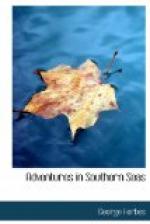Pedro de Castro, Donna Isabel’s son, had now been forgiven his treachery toward us in stealing our vessel, since Hartog considered his punishment in having been marooned upon a desert island commensurate with his offence. He was, therefore, permitted to join us in the cabin, and was given employment as ship’s purser, for which he was well suited. He expressed great contrition for what he had done, and I honestly believe at the time he intended to serve us faithfully. But treachery once practised is oft-times repeated, so I made up my mind to keep a watchful eye on Pedro de Castro lest we again be caught tripping.
We now proceeded northward, coasting with great care a succession of small rocky islands that appeared to be uninhabited. As we proceeded, the weather became rough and tempestuous, the sea running so high that it sometimes threatened to engulf us. During the whole of our voyage we had not met with such a mountainous sea.
At last we perceived a land to the north, trending to the north-east, of which the coast seemed to be one continuous rock, remarkably level at the top, and of a reddish colour, against which the sea broke with such fury as to make a landing impossible, but Donna Isabel declared this rock to be one of the islands of Armenio we had come in search of. As there were no other islands to be seen, we concluded that during the ages which had passed since the white-skinned people inhabited them, the continuous beating of the waves had gradually demolished the islands until nothing remained but the plateau of red rock to which we had come, and over which the sea sometimes swept in a mass of foam. But, having come to the island of her dreams, Donna Isabel would not leave it until we had ascertained, beyond doubt, that a landing was impracticable. It was not handsome, white-skinned natives whom we had come in search of, she said, but solid gold, which neither tempests nor seas can destroy. In order to satisfy her, we remained several days in the vicinity of this mass of rocks, hoping that the weather would moderate, so as to make possible a landing upon it, and at last we were rewarded for our patience by a lull in the heavy breakers, so that the pinnace, of which I took charge, was able to approach close to the steep and jagged shore. Thereupon six of the Spaniards leaped overboard, trusting to their skill as swimmers to make the land, which they did, remaining on shore for upward of an hour. When they returned they reported the rock to be a mass of auriferous quartz, in which was embedded more gold than they had ever thought to see in one place, but so tightly wedged was it between the crevices that they had been unable to bring any of it away except a few small specimens which they showed us. With picks and crowbars, however, they declared it would be easy to obtain an unlimited supply of gold.
When we reported the finding of the gold to Donna Isabel, she vowed she would never consent to abandon the treasure. “The sea cannot always be rough,” she said. “A calm must follow. Let us, therefore, wait in patience until it comes, so that we may land and enrich ourselves.”




